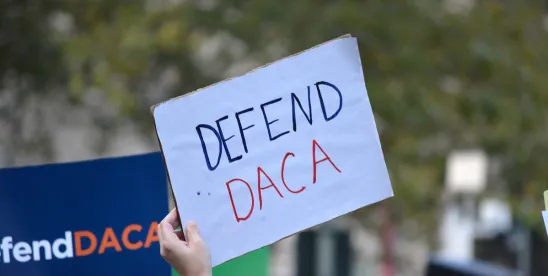Among the multiple executive actions the White House announced on June 18, 2024, was one stating it was taking steps to facilitate the process for certain Deferred Action for Childhood Arrivals (DACA) recipients to obtain work visas/status. DACA was created in 2012 by President Barack Obama as a means for immigrant youth who met certain eligibility requirements to qualify for work authorizations and obtain “deferred action.”
While DACA protection has enabled hundreds of thousands of individuals to legally work and live in the U.S., the program has faced considerable uncertainty since 2017, when the Trump administration initially sought to terminate the program, but was prevented from doing so in the federal courts.
The program continues to face legal challenges, and additional litigation before the U.S. Supreme Court is likely. Fundamentally, DACA is not a legal status – the reliance on “deferred action” simply reflects the U.S. Department of Homeland Security’s (DHS) decision not to bring immigration removal proceedings against a specific individual. While many DACA recipients and their employers have since sought to transition to a work visa or other legal status that Congress specifically established in the Immigration and Nationality Act (INA), the process for doing so is uncertain, expensive and cumbersome.
Since DACA recipients either entered without authorization or were out of status when they received DACA protection, they are typically ineligible for a transition to a lawful status within the U.S.
Instead, they are required under immigration law to “consular process” outside the U.S. and obtain a work visa at a U.S. consulate. The individual’s departure from the U.S. could trigger removal bars (similar to those described above), requiring the individual to obtain a temporary waiver of inadmissibility from the government. These waivers, known as “d3 waivers” based on the section of the INA to which they relate, can take months to obtain and the outcome of such a waiver is not certain. These cumulative issues have chilled the interest of many employers and DACA recipients in pursuing these waivers.
On July 15, 2024, the U.S. Department of State made changes to the Foreign Affairs Manual (FAM), which is controlling guidance for consular officers at U.S. Consulates on factors to consider when adjudicating waiver requests. The three primary changes that the DOS made to 9 FAM 305.4-3 are:
- Expanding the factors that would have a positive effect on U.S. public interests in granting a waiver to include circumstances “where the applicant has graduated with a degree from an institution of higher education in the United States, or has earned credentials to engage in skilled labor in the United States, and is seeking to travel to the United States to commence or continue employment with a U.S. employer in a field related to the education that the applicant attained in the United States....” These changes noted in bold are clearly designed to benefit many DACA recipients.
- The second change creates a mechanism for a waiver applicant whose request is denied by a consular officer to request State Department review in circumstances involving “significant public interest,” which in turn cross-references the factors above that are of particular benefit to DACA recipients.
- The FAM was also updated to reflect the ability of DACA recipients who have graduated from an educational program in the United States or are seeking to reenter the U.S. with a visa as beneficiaries of an offer of employment to request an expedite of the waiver request. This change is particularly critical as one of the greatest challenges that DACA recipients face when seeking a waiver is the uncertain adjudication period, which often stretches for months.
Collectively, these updates are significant and will benefit several DACA recipients who are beneficiaries of employer sponsorship. These pathways also create a mechanism for U.S. employers to transition DACA recipients from DACA, with its increasing uncertainty, to a more stable work visa. DACA recipients should, of course, plan prudently if considering a departure from the U.S. to apply for such a waiver and should also apply for advance parole before departing the U.S. so as to provide a mechanism for reentering the U.S. if the waiver request is denied.





 />i
/>i
